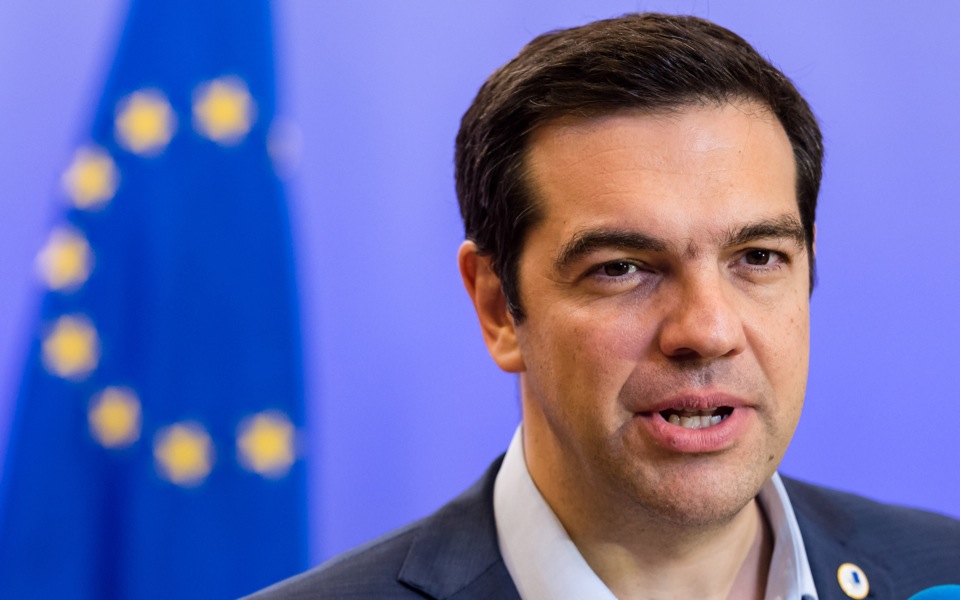Tsipras faces SYRIZA mutiny after Greece capitulates to demands

Prime Minister Alexis Tsipras will return to face a mutiny within his coalition after he surrendered to European demands for action to qualify for up to 86 billion euros ($95 billion) of aid Greece needs to stay in the euro.
Tsipras is due back in Athens on Monday to confront lawmakers from his SYRIZA led bloc who rebelled when he sought their endorsement two days ago for spending cuts, pensions savings and tax increases. The Greek parliament has until Wednesday to pass into law key creditor demands including streamlining value-added taxes, broadening the tax base to increase revenue and curbing pension costs.
With the threat of defections rippling through his bloc, Tsipras will “have to change his administration and clear out hardliners and radicals from his party,” as well as rely on opposition support to pass the necessary measures, said Eurasia Group analysts Mujtaba Rahman and Federico Santi. “But it is a tough call to determine how Tsipras will go about doing this.”
Attention is shifting to the parliamentary hurdles ahead before Greece can even begin negotiations with creditors to access a third international bailout in five years. The euro fell and Spanish and Italian bonds declined as the scale of the remaining challenges sank in.
Default averted
“There’s a vista of division within the party, part of SYRZA officials and lawmakers do not accept the tactics followed by our prime minister,” Yanis Balafas, a SYRIZA lawmaker close to Tsipras, said in an interview. “What matters now is that the worst case scenario of a default has been averted.”
After a six-month offensive against German-inspired austerity succeeded only in deepening his country’s economic mess and antagonizing his European counterparts, there was little for Tsipras to tout as evidence of a face-saving compromise following a rancorous summit in Brussels that ran for more than 17 hours.
“Trust has to be rebuilt, the Greek authorities have to take on responsibility for what they agreed to,” German Chancellor Angela Merkel said after the meeting ended just before 9 a.m. in Brussels on Monday. “It now hinges on step-by- step implementation of what we agreed.”
‘Successful evaluation’
The conditions that Tsipras swallowed comprised a laundry list of unfinished business from Greece’s two previous bailouts and a new demand for the government to transfer 50 billion euros of state assets to a holding company that will seek to either sell or generate cash from them.
Tsipras hailed the fact the fund would be based in Greece, not Luxembourg as had been suggested. He also latched onto the prospect of debt relief, albeit distant, after creditors rejected his pleas for a cut in the face value of Greek debt of about 310 billion euros. Merkel said interest-payment grace periods and longer maturities will “be discussed once there is a successful evaluation of the new Greek program.”
While the summit agreement averted a worst-case outcome for Greece, it only established the basis for negotiations on an aid package, which would also include 25 billion euros to recapitalize its weakened financial system.
The Stoxx Europe 600 Index climbed 1.6 percent at 1:39 p.m. in Frankfurt, while the euro dropped 0.9 percent.
As the summit approached its climax in the early hours of Monday, the main session broke at least four times to allow Tsipras to confer with associates in Athens, according to one official with knowledge of the talks.
Threats to leave
Some leaders threatened to leave between 2 a.m. and 4 a.m. when a deal looked very unlikely given the late hour. By 6 a.m., both the German and Greek delegations said that a deal was impossible and prepared to leave, before being urged to give it one last push, according to a separate EU official.
The terms are significantly tougher than those Tsipras labelled “blackmail” when he persuaded Greek voters to reject them in a referendum a week ago. In addition to requirements on pensions and sales taxes, measures that Tsipras accepted last week, the leaders demanded that creditor representatives return to Athens with full access to ministers and a veto over relevant legislation, intrusions that he has long rejected.
“We had to succeed,” said French President Francois Hollande. “If Greece had left the eurozone what would the world have said?”
The banks are expected to stay closed on Monday, so the ECB won’t need to adjust its now-frozen emergency credit line to the banks right away, an EU official said as leaders met. The ECB’s Governing Council is slated to review the banks’ situation again on Monday when the Greek government is set to renew a bank holiday and capital controls decree.
Tsipras said that the deal had prevented the banking system from collapsing but will inevitably harm the economy.
“We put up a hard fight for the past six months and we fought to the end in order to get the best out of it, to get a deal which will allow the country to stand on its feet and the Greek people to keep fighting,” Tsipras said in Brussels.
[Bloomberg]





